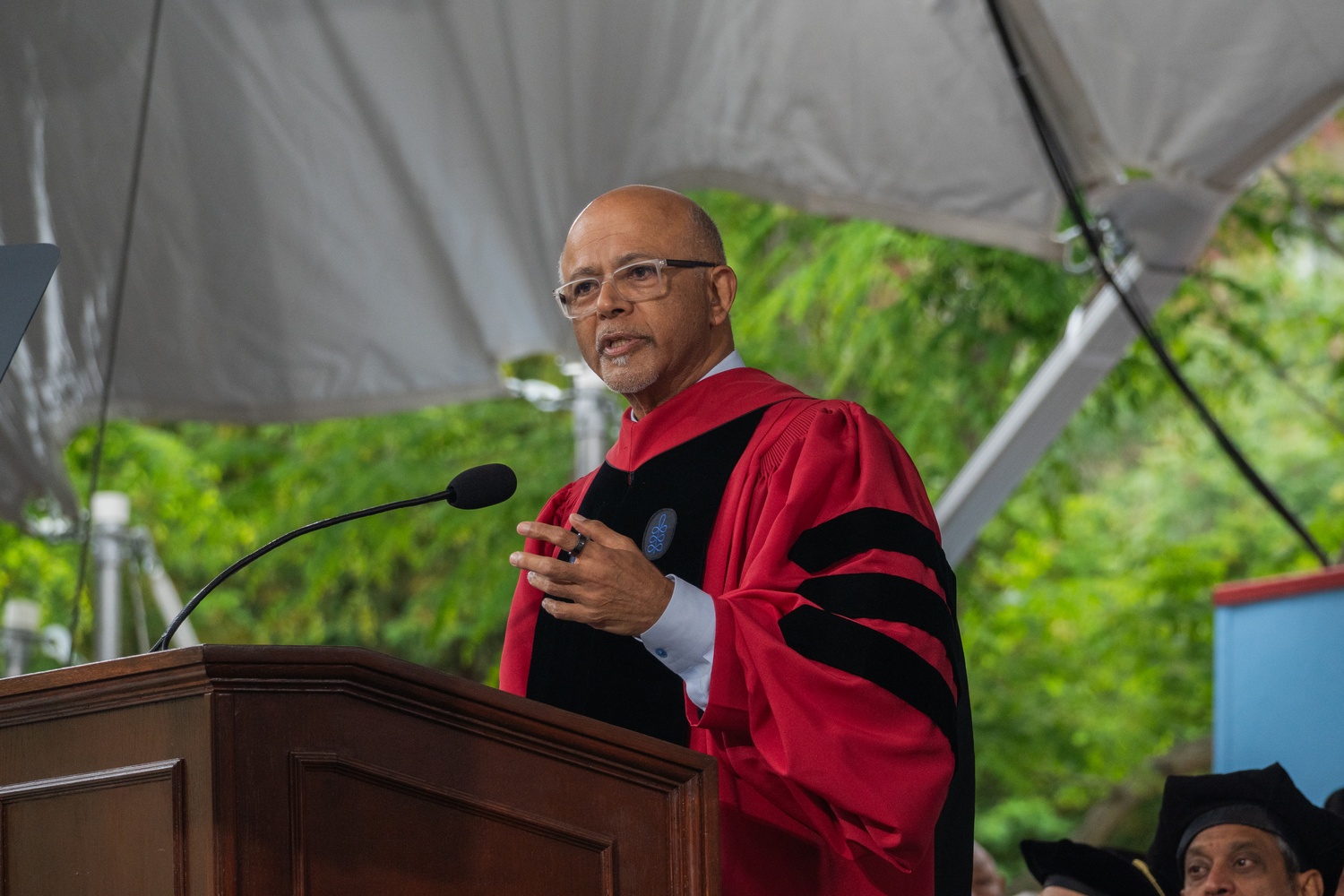
News
Summers Will Not Finish Semester of Teaching as Harvard Investigates Epstein Ties

News
Harvard College Students Report Favoring Divestment from Israel in HUA Survey

News
‘He Should Resign’: Harvard Undergrads Take Hard Line Against Summers Over Epstein Scandal

News
Harvard To Launch New Investigation Into Epstein’s Ties to Summers, Other University Affiliates

News
Harvard Students To Vote on Divestment From Israel in Inaugural HUA Election Survey
Commencement Speaker Abraham Verghese Slams Trump Admin, Praises Former Colleague Garber

In his address to the Class of 2025, Stanford University professor and best-selling novelist Abraham Verghese lauded Harvard’s opposition to the Trump administration’s recent attacks against it — and acknowledged the “outrage” students may be feeling.
Verghese, who worked alongside Garber at Stanford for four years, praised his former colleague’s decision to defy federal pressure and take the Trump administration to court in two separate suits.
“More people than you realize are grateful for Harvard for the example it has set,” he told graduates to raucous applause. “By your clarity in affirming and courageously defending the essential values of this university, and indeed of this nation.”
He also did not mince words in his rebuke of the Trump administration, condemning what he called a “cascade of draconian government measures” that have led to widespread "uncertainty, pain, and suffering.” Verghese’s speech comes just one week after the Department of Homeland Security threatened to revoke Harvard’s certification to admit international students — a move the University is now fighting in court.
Verghese took the stage after several high-profile commencement speakers in recent years, including actor Tom Hanks and journalist Maria Ressa. He poked fun at students who sought a more recognizable name after he was announced as the Commencement speaker in February.
“I felt you deserved to hear from a star, a legend, a Nobel prize winner, or perhaps, God knows, from the Pope himself,” he quipped. “Maybe next year, huh?”
Still, he said, it was “fitting” that students were hearing from an immigrant — someone who grew up under authoritarian rule in Ethiopia, lived through a military coup, and completed his medical training in India during Indira Gandhi’s declaration of emergency rule.
“When legal immigrants and others who are lawfully in this country worry about being wrongly detained and even deported, perhaps it’s fitting that you hear from an immigrant like me,” he said.
Verghese used his address to celebrate what he saw as the enduring promise of America — a price where immigrants can thrive, and where he found his calling, not only as a doctor, but also a writer.
His address revolved around three central ideas: the moral clarity revealed by decisions made under pressure, the necessity of compassion, and the finite nature of time. Drawing on his medical career, Verghese spoke of his experience treating AIDS patients in rural Tennessee in the 1980s — young men, many estranged from their families, who returned home to die.
“They taught me about manhood — not the caricature of manliness, the posturing that has become so fashionable lately — but the manliness that allowed them to be compassionate, generous, and steadfast even in the depths of their suffering,” he said.
He ended the address by reading a letter written by one of those patients to his mother.
“If anyone ever asks you if I went to heaven, tell them this: I just came from there,” the letter read. “No place could conceivably be as wonderful as where I’ve spent these last 30 years.”
Verghese urged graduates to protect the values that brought them to this moment, to honor the sacrifices that made their education possible, and to choose with intention.
“Make your decisions worthy of those who supported, nurtured, and sacrificed for you,” he said. “And make good use of your time.”
—Staff writer Dhruv T. Patel can be reached at dhruv.patel@thecrimson.com. Follow him on X @dhruvtkpatel.
—Staff writer Grace E. Yoon can be reached at grace.yoon@thecrimson.com. Follow her on X @graceunkyoon.
Want to keep up with breaking news? Subscribe to our email newsletter.
